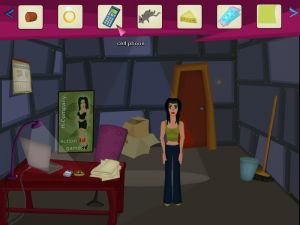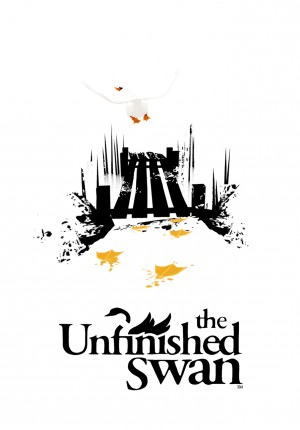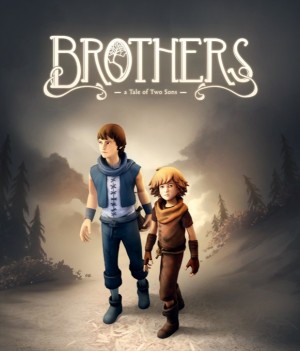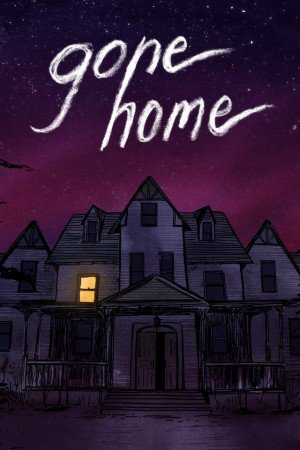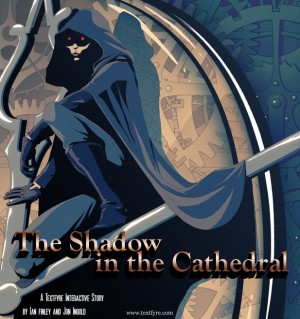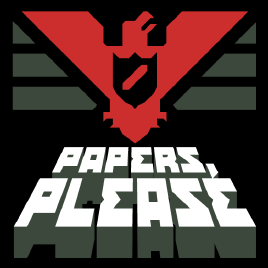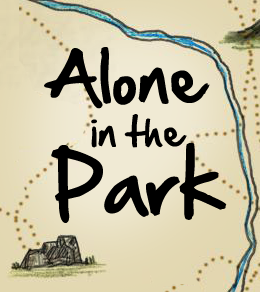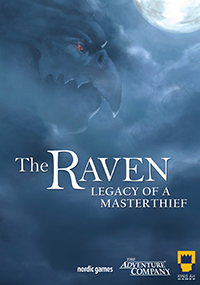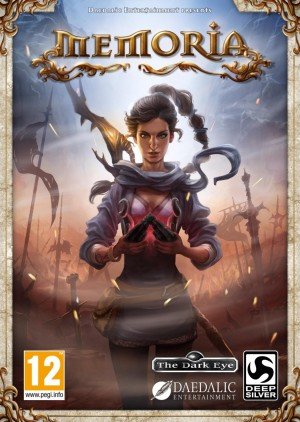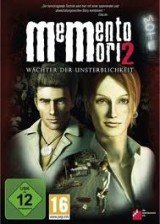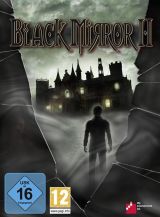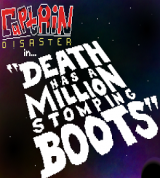Review for Helga Deep in Trouble page 2
After their well-received 2005 debut freeware release of Five Magical Amulets, OFF Studio's first commercial adventure has been a long time coming. Rather than taking us back to the magical land of Nyron, however, Helga Deep in Trouble instead plunges us headlong into the cutthroat world of game development. And let's be clear from the start: this is a very different game. Where Five Magical Amulets was innocent and heartwarming, Helga is sassy and sarcastic. In fact, why not hear from the titular heroine herself? There's bound to be something in the game's FAQ. Helga, how should I review your game?
"Reading internet forums I got the following insights about my previous games: The art looks like it's made by a 6 years old kid. The story is unfunny and sexist. The music sounds like elevator muzak. And it doesn't even have voiceovers – you should mention that. Then add some random number rating. It won't take more than half an hour. Easy money."
Let me stop you right there, Helga. As ever, you're your own harshest critic, but let's consider those points anyway.
First up, the story. Expanding on their earlier parody adventure Five Lethal Demons, Helga runs Kick Off Studio (see what they did there?), a developer of 3D first-person shooter games. She has little time for all this adventuring, puzzle-solving nonsense (even the password puzzle in their last game stumped 90% of their players!) and instead focuses on squeezing in as much violence, blood and gore as she can manage. She's single-minded and ruthless in her approach, with little regard for things like employee welfare or indeed caring about other people at all – in her previous outing she literally carried a whip. Despite her passion and talent for slave-driving, however, KOS's last release was a disaster, development on their current game has stalled and (as we join the actual game) she's been forced to sell the studio and is in the process of hiring a new manager.
If Helga sounds like an amalgamation of every Type A boss you've ever had, that's because she is. Indeed, the game as a whole is stocked with caricatures: her staff are a bunch of socially awkward nerds who, rather than vote for a candidate with the knowledge and experience to take over, instead fall for a rich blonde airhead. And yes, reviewer-Helga has a point: some of those caricatures are pretty sexist. Helga's writer, for example, commands her to make him dinner because she's a woman. But it's all very tongue-in-cheek, and for the most part this is a useful shorthand, preventing the game from getting bogged down in character development and allowing it to get straight on with the pervasive sarcastic humour.
And the cast are definitely caricatures rather than just stereotypes: for example, one local busybody is so keen to make sure she doesn't miss anything that she literally never sleeps or leaves her window. At one point, suspicious of Helga, she tries a word-association ploy she saw on a cop show but has to wait for next week's episode before she knows how to interpret the results. I was particularly amused by the local shopkeeper, obsessed with getting Helga to stop smoking and determined to mount a denial-of-service attack on the megastores by the simple expedient of... not shopping there.
To get back to the events at Kick Off Studio, Helga is promptly demoted to office lackey by Magda (the airhead), then sacked. Furious, she stomps out and promptly sets up her own H-Company, vowing to woo back her former employees and get back at Magda. The rest of the game chronicles her struggle to control her abrasive personality and suck up to people, but (as you can probably imagine) that's never going to end well. The overall tone of the game can best be described as black farce, with Helga getting herself into increasingly ridiculous situations and leaving ever more chaos and destruction in her wake.
I'd like to be able to say that Helga learns her lesson and everything turns out for the best in the end, but I can't, and that's perhaps my biggest issue with the game. Despite occasional moments of insight, she remains unrepentant for the most part. And although a couple of her victims forgive her, there's a persistent feeling that everything is going to hell in a handcart and there's no way out short of an improbable last-minute twist and a sprinkling of fairy dust. But there is no such fairy dust here, and I could never really identify with Helga or get pulled into her story. In the end, I was left feeling flat and frustrated as the credits rolled, though Helga’s fate is nothing if not fair.
Anyone who has played Five Magical Amulets will recognise the developer's distinctive visual style; not exactly the daubings of a 6-year-old, but naive and charming. Here, though, Olga Fábry (the artist on both games) seems to be channelling Day of the Tentacle, with its cartoony style and twisted perspectives. This, combined with the relatively low 800x600 resolution, gives the game a retro feel, which is fitting with its somewhat old-fashioned gameplay. The animations are much smoother here, and background motions such as the programmer typing or clouds scudding across the sky in the park give the scenes some life. At times, though, I felt more could have been done: a lap-dancing bar Helga visits early on is completely empty and static, for example. Admittedly, it was during the day and the bar does come to life later once the sun goes down, but it still could have done with something going on, even if it was only a janitor sweeping the floor.
The uncluttered cartoon look also means there's no need to worry about pixel hunting: everything you'll care about is easy to spot. One curious feature, however, is that many scenes include highlighted objects you can't actually interact with. Hovering over these hotspots shows the object's name, but right-clicking – which would normally bring up an action bar – does nothing. Helga has nothing to say about them, and they never feature in any of the puzzles. They're just... there. It feels as if the developer meant to go back and at least add descriptions, but then ran out of time.
The soundtrack tries hard to keep the atmosphere jaunty and upbeat, and the bluesy, funky score that plays on the title screen is a particular highlight. As reviewer-Helga pointed out, there's no voice work, but a good and varied selection of tunes greet you as you move from location to location. That said, many of them consist of a short melody that's repeated through a series of chord changes; the overall effect came close to being annoying at times (especially when I was stuck on a puzzle), but on the whole it works well. The music also changes to highlight scenes of particular tension, switching to a pounding, menacing theme; this happens quite suddenly, though, and the original music comes back just as abruptly. Usually scene changes prevent this from being too jarring, but on one occasion I was left looking at an obviously-fuming Helga with an incongruously laid-back song playing in the background.
Unfortunately, the translation from the script's original Czech can be a bit rough in places. It's grammatically correct and always good enough to understand what's going on, but it comes off sounding a bit stilted and (I suspect) some of the humour doesn't quite make the transition. There are still some funny scenes, but what seems intended as free-flowing witty banter winds up feeling a bit leaden. On the upside, the verbosity of Five Magical Amulets is gone in favour of a much snappier delivery.
The interface is pretty much classic point-and-click. Mousing up to the top of the screen brings up your inventory, left-clicking on an object selects it and right-clicking brings up its action bar. There's a screen at the start of the game to explain things, but for most players it'll scarcely be necessary. You also acquire a cell phone, an old one that's modelled perhaps too realistically: to navigate through your contacts or text messages, you have to click the on-screen up and down buttons and can't just click on the entry you want. I kept trying to do just that, only to remember and (grumblingly) go and click the buttons instead.
One unexpected addition comes just after Helga has been sacked: the action bar sprouts a new option. To start with, there are three – look at, talk to and use – but then three becomes four with the inclusion of an unannounced heart icon, which makes Helga be nice to people for a change and pretend to take an interest in them. (Later on, the gloves come off and she gets an option to be nasty to them instead.) That's all very well and makes sense (since she's trying to win her former employees back at that point) but it would have been good to have some warning or explanation rather than having to figure it out by experimentation.
Clues and hints in general are in pretty short supply. Although the puzzles are mostly logical (albeit in a twisted, cartoon-logic kind of way at times), there's little feedback to nudge you onto the right track when you go wrong. Also, interacting with objects will often give you a "nothing to see here"-type response until you actually need them; I frequently got stumped because I was misled to believe that important objects were just scenery. That said, the provided hint system works pretty well, graduating from initial gentle tips to giving you the complete solution. A word of warning, though: at the beginning of the game, you're asked whether or not you want to have hints available. If you say no, the hint system is deactivated and there's no way to bring it back short of starting over.
This is particularly unfortunate, as there's a short bonus chapter for players who pick up certain objects hidden throughout the game, but the counter showing your progress in collecting them is on the hint screen. That means you won't know how well you're doing if you disable hints; on my first playthrough I missed out on just one object without realising.
The puzzles are standard inventory-based fare, apart from a few breaks: assembling a torn note, participating in a dating game and playing dress-up. (You'll also get to play one of Helga's games at one point, but quickly discover that she hasn't shaken the bugs out yet.) At times the obstacles can feel contrived, such as when Helga's former writer rejects the pizza she buys for him in favour of a stew with (you guessed it!) a long list of ingredients. With typical adventure game logic, obtaining even the simplest of these is tricky and leaves Helga locked in a bathroom! Is this a game design cliché or a sly commentary on conventional adventure game puzzles? Given the subject matter, it's hard to know. In a more obviously deliberate nod to genre formula, the solution to another puzzle is intentionally contrived and arbitrary, though thankfully you're also provided with instructions.
Weighing in at 5-6 hours of playtime, there's much to enjoy here if you like your humour dark and don't mind playing an unsympathetic heroine. The graphics are well drawn and colourful, the score is jaunty and the puzzles are fair. However, unless you turn to the hints you won't get many other nudges in the right direction, the script just isn't always as funny as it wants to be, and the ending is a real downer. Overall, Helga Deep in Trouble has the feeling of a game that could have been better with a bit more polish, but if black farce is your thing it is well worth checking out.


